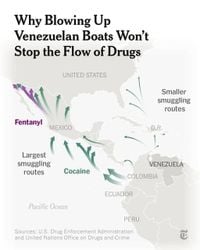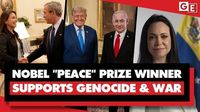In one of the most dramatic turns in Latin American politics this year, the 2025 Nobel Peace Prize has been awarded to María Corina Machado, a Venezuelan opposition leader whose name is now synonymous with both hope and controversy. The announcement comes at a time of extraordinary tension in Venezuela and the wider Caribbean, as the United States, under President Donald Trump, has launched a massive military operation against what it claims are Venezuelan drug cartels. The operation, which includes ten warships—among them three destroyers, an amphibious assault ship, a missile cruiser, and a nuclear-powered submarine—along with about 10,000 troops, has been described by experts as nearly unprecedented in the region, according to reporting from El País.
Officially, the U.S. deployment is part of a declared war on drug cartels, with President Trump informing Congress of the new military engagement without allowing for debate. In the first phase of the offensive, four boats allegedly sent by Venezuelan drug cartels were destroyed in what Washington calls counter-narcotics operations. The U.S. government claims these vessels were carrying enough drugs to kill tens of thousands of Americans, yet has offered no evidence beyond videos of the explosions. At least 21 people have been killed in these operations, including four Colombians, according to Bogotá. The scale of the military mobilization is remarkable, representing 14% of the U.S. Navy’s global deployment.
But critics, including senior fellow Christopher Sabatini of Chatham House, argue that the real aim is not the drug war, but regime change in Venezuela. “This isn’t about ending drug trafficking, but rather about bringing about a change of regime—a deeply corrupt and criminal regime—and making sure the move costs Washington as little as possible,” Sabatini told El País. He described the White House’s approach as “gunboat diplomacy,” intended to intimidate those around President Nicolás Maduro into abandoning him.
Juan González, President Biden’s Latin America adviser, echoed this skepticism in a recent interview with CNN, calling the deployment “vastly disproportionate to any real counter-narcotics mission” and suggesting it appears to be preparation for regime change. The Trump administration has already listed several Venezuelan cartels, including Tren de Aragua, as terrorist organizations. Trump himself recently declared that the operation would soon enter “phase two,” moving from sea to land—a move many fear could escalate the conflict further.
Amid this climate, the awarding of the Nobel Peace Prize to María Corina Machado has set off a firestorm of debate. On one hand, she is celebrated by much of the international community for her role in promoting democratic rights and her leadership in the aftermath of Venezuela’s disputed 2024 election. She spearheaded a movement to collect paper voter tallies that allegedly showed an opposition victory, challenging Maduro’s claims—a campaign that earned her global recognition. “We are facing the real possibility that Venezuela will truly free itself and move toward a transition that will be orderly, because 90% of the population wants the same thing,” Machado told El País after the Nobel announcement.
Yet, as Geopolitical Economy reports, Machado’s record is far from unblemished. She is a polarizing figure, described as a far-right coup leader who has for years called for U.S. military intervention to overthrow Maduro’s government. Machado has openly endorsed U.S. sanctions on Venezuela—measures that, according to studies cited by economists Mark Weisbrot and Jeffrey Sachs, have caused tens of thousands of deaths, and possibly hundreds of thousands, by restricting access to food and medicine. “These sanctions are surgical and effective; with a strong financial, commercial, and political impact,” Machado tweeted in 2017.
Machado has also expressed strong support for Israel during its 2025 campaign in Gaza, which a United Nations commission has described as genocide. In January, she held a call with Israel’s Foreign Minister Gideon Sa’ar, expressing “gratitude to the Ministry of Foreign Affairs of Israel” and emphasizing her solidarity with the Israeli government. Venezuela, led by Maduro, has long opposed Israel’s actions and cut diplomatic ties, instead supporting the Palestinian cause.
Machado’s critics say her support for extrajudicial U.S. military actions—such as the destruction of Venezuelan boats in international waters—further undermines her peace credentials. She has reportedly worked closely with Trump administration officials to coordinate efforts to oust Maduro, and has advocated for privatizing Venezuela’s vast oil reserves if she comes to power. In her own words to the Financial Times: “We have to privatise and open up the markets, beginning with the energy sector. [Venezuela’s] enormous oil and gas reserves, along with its lucrative minerals, will all be open to private investment.”
Meanwhile, tensions inside Venezuela are running high. The Maduro government has ramped up military exercises, increased security around Caracas, and fortified key infrastructure, especially in coastal areas where fears of U.S. drone strikes are spreading. Panic buying has returned among Venezuelans, many of whom are more focused on daily survival than international politics, given the country’s ongoing economic decline.
The diplomatic situation has deteriorated further. In August, the U.S. doubled its bounty to $50 million for information leading to Maduro’s capture. By October, Trump had ordered a halt to all diplomatic contacts with Venezuela, rejecting Maduro’s offers to share oil and mineral resources or to distance Venezuela from China, Russia, and Iran. The only ongoing contact is the return of about 10,000 deported migrants from the U.S. since February.
Inside Washington, debate over the legality and wisdom of the U.S. military campaign continues. Last week, the Senate narrowly rejected a proposal to halt attacks in the Caribbean before the 60-day deadline set by the War Powers Resolution. Katherine Yon Ebright of the Brennan Center for Justice warned that if Trump continues the operations without congressional approval, he risks breaking the law. The administration could request an additional 30 days to withdraw forces, but the clock is ticking.
Back in Caracas, the atmosphere is tense but uncertain. The government is trying to project normalcy—decorating public buildings for Christmas and continuing with official events—while reinforcing security around the presidential palace. Resistance has become a way of life for many Venezuelans, who have endured years of economic hardship and international sanctions. As one resident told El País, “There’s fear in the streets; people are expecting something.”
The Nobel Committee’s decision to honor Machado has only deepened the polarization. Supporters hail her as a champion of democracy, while detractors see her as a symbol of foreign intervention and failed opposition tactics. The prize, critics argue, is yet another example of the West using the language of peace to justify actions that bring anything but. As the U.S. naval fleet looms off Venezuela’s coast and the world watches for Trump’s next move, the stakes for the country’s future have never been higher.
In this charged landscape, the Nobel Peace Prize has become a lightning rod—reflecting not only the hopes for a democratic transition in Venezuela, but also the bitter divisions over how such change should come about, and at what cost.


